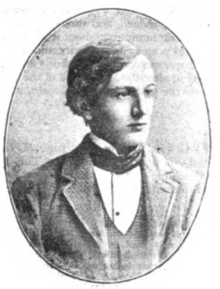Ruaraidh Erskine
Ruaraidh Erskine of Marr (15 January 1869 – 5 January 1960) (Scottish Gaelic: Ruaraidh Arascain is Mhàirr) was a Scottish nationalist political activist, writer and Scottish Gaelic language campaigner.
Ruaraidh Erskine | |
|---|---|
 Stuart Erskine pictured in The Whirlwind in 1890 | |
| Native name | Ruaraidh Arascain is Mhàirr |
| Born | Stuart Richard Joseph Erskine January 15, 1869 1 Portland Place, Brighton, East Sussex, England |
| Died | January 15, 1960 (aged 91) |
| Occupation | Political activist, writer and Scottish Gaelic language campaigner |
| Language | Scottish Gaelic |
| Nationality | Scottish |
| Literary movement | Scottish nationalism |
| Spouse | Muriel Lilias Colquhoun Graham |
| Relatives | William Macnaghten Erskine and Caroline Alice Martha Grimble |
Early life
Ruaraidh Erskine was born The Honourable Stuart Richard Joseph Erskine at 1 Portland Place, Brighton, East Sussex, England on 15 January 1869. He was the third of the four children born to William Macnaghten Erskine, 5th Baron Erskine (1841–1913), an army officer, and his wife, Caroline Alice Martha Grimble. The family were descendants of the Erskine Earls of Buchan.[1]
Erskine learned to speak Scottish Gaelic from his childhood nanny, who came from Harris, and this kindled the enthusiasm which was to be a main hallmark of his career. His imagination was fired early by the Irish nationalist movement and these combined influences, together with his family's Scottish roots, led to his development as a prominent Gaelic nationalist, whose compelling dream was of a self-governing Celtic Scotland.[1] As essential steps towards the realization of this dream he was actively involved in the fostering of Gaelic consciousness and in the extension of Gaelic usage, especially in the written form. He hoped that a significant extension of Gaelic literary range would contribute to the raising of literary standards, in a reaction against what he saw as the down-grading influence of music-hall and ‘pop’ culture on Gaelic verse in the second half of the nineteenth century. He probably also viewed his activity as a response to the dominance of folk culture in the Gaelic literary world.[1]
Journalism and the Neo-Jacobite Revival
In 1890, he co-founded The Whirlwind with Herbert Vivian[2] a weekly newspaper. Although the paper was published for less than a year, it printed works by a number of notable artists, including Walter Sickert and James NcNeill Whistler, and espoused a Jacobite philosophy, and the restoration of the House of Stuart. Erskine, along with Vivian and Melville Henry Massue founded the Legitimist Jacobite League of Great Britain and Ireland in 1891, and he was president of the organisation in 1893, 1894 and 1897.[3]
In 1891, he stood as a candidate for the Buteshire constituency as a "Scottish Tory Home Ruler",[4] but by October of that year, he had withdrawn.[5]
Scottish nationalism
In 1892, aged 23, he became vice-president of the Scottish Home Rule Association, but he grew to oppose the notion of home rule for Scotland within the United Kingdom and went on to support Scottish independence.
In 1904 he formed the Guth na Bliadhna (Voice of the Year) publication and used it to advocate independence and a coming together of the Gaels of both Scotland and Ireland to aid each other in a campaign to establish their respective languages as the official language of their country. He also used the magazine to call for the formation of a political party to campaign for independence. His activities with the publication brought him into contact with William Gillies, with whom he formed the Scots National League (SNL) in 1920, thus going some way towards the realisation of the formation of a Scottish nationalist political party.
Despite his aristocratic background, Erskine had links with the socialist figure John Maclean who was himself an advocate of an independent (socialist) Scotland. Erskine had at one stage described socialism as "a predatory creed", but by the time of the First World War he was becoming more politically radical and finding sympathy with the cause of figures such as Maclean.
He championed the Easter Rising in Ireland in 1916, and attempted to foster links with the Irish nationalist community by attempting to set up a joint Scottish-Irish Celtic newspaper with Art O'Brian the president of the Irish Self Determination League.
Erskine attempted to get independent representation for Scotland at the Paris Peace Conference at the end of the First World War. In this he was ultimately unsuccessful, but it did attract the support of figures such as James Maxton, a prominent figure in the Independent Labour Party at the time.
Erskine and Gillies led the SNL into joining with other groups to form the National Party of Scotland (NPS) in 1928. The NPS was quite different in outlook to the SNL had been and many SNL members left the NPS due to this factor, including Erskine. After this, Erskine was to play little role in politics.
Erskine has been accused of being reactionary. Some of his ideas, however, have gained in popularity over time, e.g. Scottish independence, land reform (through the land league), and even the Scottish Gaelic revival. His pan-Celticism has received some attention from the Celtic Congress and Celtic League.
Personal life
In May 1891, the engagement of Erskine and Muriel Lilias Colquhoun Graham was announced;[6] they were married on 18 July 1891.[7]
See also
- Hugh MacDiarmid
- Compton MacKenzie
References
- Derick S. Thomson, ‘Erskine, Stuart Richard (1869–1960)’, Oxford Dictionary of National Biography, Oxford University Press, Oct 2009; online edn, Sept 2010
- "The Whirlwind". New York: The Metropolitan Museum of Art.
- Pittock, Murray (1 August 2014). Spectrum of Decadence: The Literature of the 1890s. Routledge.
- "The Note Book". Sheffield Evening Telegraph. 15 January 1891 – via British Newspaper Archive.
- "News". Glasgow Herald. 29 October 1891 – via British Newspaper Archive.
- "News". Morning Post. 20 May 1891 – via British Newspaper Archive.
- "Marriages". Northampton Mercury. 31 July 1891 – via British Newspaper Archive.